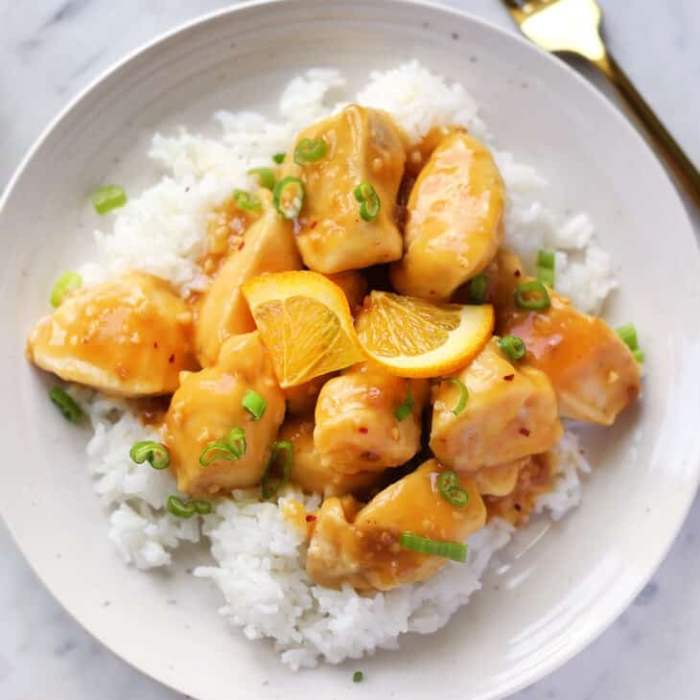Recipe Orange Chicken Sauce A Comprehensive Guide
Orange Chicken Sauce: A Deep Dive: Recipe Orange Chicken Sauce
Recipe orange chicken sauce – Orange chicken sauce, a staple in many American-Chinese restaurants, boasts a vibrant flavor profile that balances sweet, sour, and savory notes. Its popularity stems from its versatility and adaptability, making it a favorite for various dishes. This exploration delves into the nuances of orange chicken sauce, from its historical origins and ingredient variations to its culinary applications and visual appeal.
Orange Chicken Sauce Variations
The orange chicken sauce we know today is a result of culinary evolution, drawing influences from various cuisines. Several variations exist, each with unique characteristics. The key differences often lie in the balance of sweet and savory elements, the use of different citrus fruits, and the inclusion of additional spices.
| Variation Name | Main Ingredients | Sweetness Level | Savoriness Level |
|---|---|---|---|
| Classic Orange Chicken Sauce | Orange juice, soy sauce, honey, rice vinegar, cornstarch | Medium | Medium |
| Spicy Orange Chicken Sauce | Orange juice, soy sauce, honey, rice vinegar, cornstarch, chili garlic sauce | Medium | High |
| Sweet and Sour Orange Chicken Sauce | Orange juice, soy sauce, sugar, rice vinegar, cornstarch, pineapple juice | High | Medium-Low |
| Mandarin Orange Chicken Sauce | Mandarin orange segments, soy sauce, honey, rice wine vinegar, cornstarch | Medium-High | Medium |
Historically, orange chicken sauce’s origins are rooted in Chinese cuisine, but its current form is largely a product of American-Chinese culinary innovation. The exact timeline is difficult to pinpoint, but its popularity surged in the latter half of the 20th century, becoming a signature dish in many Chinese-American restaurants. Influences from Cantonese and other regional Chinese styles likely contributed to its development.
Comparing three distinct recipes – a classic, a spicy, and a sweet and sour version – reveals the significant impact of ingredient ratios. The classic version offers a balanced profile. The spicy version elevates the savoriness with chili garlic sauce, while the sweet and sour version emphasizes sweetness with added sugar and pineapple juice.
Key Ingredients and Their Roles
The success of orange chicken sauce hinges on the careful selection and proportioning of its key ingredients. Each component plays a crucial role in achieving the desired flavor and texture.
Orange juice provides both acidity and sweetness, contributing significantly to the sauce’s signature tangy flavor. It also adds a subtle layer of complexity. Soy sauce, a cornerstone of many Asian sauces, balances the sweetness with its saltiness and umami depth. Cornstarch acts as a thickening agent, creating the characteristic glossy finish.
| Thickening Agent | Characteristics | Suitability for Orange Chicken Sauce |
|---|---|---|
| Cornstarch | Creates a glossy, slightly translucent finish. | Excellent |
| Arrowroot Powder | Produces a clear, slightly less glossy finish. | Good |
| Tapioca Starch | Yields a slightly thicker, more opaque sauce. | Acceptable |
Alternatives exist for many ingredients. Maple syrup or agave nectar can replace honey, while apple cider vinegar can substitute for rice wine vinegar.
Recipe Creation and Modification

Source: daringgourmet.com
The beauty of orange chicken sauce lies in its adaptability. Modifying the base recipe allows for customization to suit individual preferences.
A low-sodium version can be achieved by reducing the amount of soy sauce and using a low-sodium alternative. A spicier version can incorporate chili flakes, diced chilies, or sriracha for an added kick.
Tips for achieving the perfect consistency and glossy sheen include:
- Whisk the cornstarch slurry thoroughly before adding it to the sauce.
- Add the cornstarch slurry slowly while stirring constantly to prevent lumps.
- Simmer the sauce over low heat to allow it to thicken evenly.
- Avoid boiling the sauce, as this can result in a grainy texture.
Adjusting sweetness and savoriness involves modifying the amounts of honey/sugar and soy sauce, respectively. Taste frequently and adjust accordingly.
Orange Chicken Sauce in Different Cuisines
While strongly associated with American-Chinese cuisine, orange chicken sauce’s versatility extends beyond its origins. Its adaptable flavor profile allows for integration into various culinary traditions.
For example, it can be used as a glaze for grilled meats in Western-style cooking or as a component in stir-fries incorporating diverse vegetables and proteins in Asian-inspired dishes. The sauce’s adaptability shines in its ability to complement various flavors and textures.
In some Southeast Asian dishes, the sauce might be adapted with the addition of fish sauce or coconut milk, reflecting local preferences. The key lies in understanding how the fundamental sweet, sour, and savory notes can be balanced to complement the specific dish and its cultural background.
Crafting the perfect orange chicken sauce involves balancing sweet, savory, and tangy notes. The key is often a well-made base, much like achieving the creamy perfection of the recipe for in n out sauce , which requires careful attention to ingredient ratios. Similarly, with orange chicken sauce, experimenting with different citrus combinations and spices can elevate the flavor profile, resulting in a truly memorable dish.
Visual Representation of Orange Chicken Sauce, Recipe orange chicken sauce

Source: abeautifulmess.com
The ideal orange chicken sauce possesses a glossy, translucent sheen. Its color is a rich, vibrant orange, possibly with slight variations depending on the ingredients used. The texture should be smooth and slightly viscous, coating ingredients evenly without being overly thick or watery. When served with chicken, the glossy sauce contrasts beautifully with the golden-brown hue of the meat, creating a visually appealing dish.
Served with steamed rice, the vibrant orange of the sauce provides a striking contrast against the white backdrop, enhancing the overall presentation. The sauce’s glossy finish also adds a layer of visual appeal, making the dish more tempting.
Commonly Asked Questions
Can I use frozen orange juice?
Yes, thawed frozen orange juice concentrate can be used, but adjust the amount based on its concentration. You may need to add a bit more to achieve the desired sweetness and acidity.
What if my sauce is too thick or too thin?
If too thick, add a little water or broth. If too thin, gently simmer uncovered for a few minutes to reduce the liquid, or whisk in a small amount of cornstarch slurry (1 tsp cornstarch mixed with 1 tbsp cold water).
Can I make this sauce ahead of time?
Yes, the sauce can be made ahead of time and stored in the refrigerator for up to 3 days. Reheat gently before serving.
What are some good protein options besides chicken?
Pork, shrimp, tofu, and even fish would pair well with orange chicken sauce.












